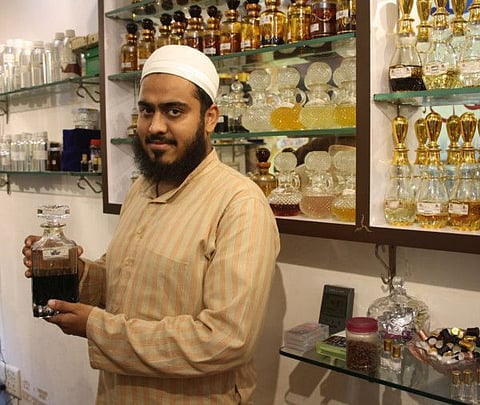A sliver of Arabia in India
Medical tourists from Arab world get a glimpse of home in India’s capital

New Delhi: While the Gulf region has been home to millions of Indians for many decades, New Delhi has come up with its own Arabian corner to make life comfortable for Arabs visiting India for medical tourism.
In south Delhi’s Sarita Vihar-Jasola area that includes Living Style shopping mall, numerous establishments like travel companies, dental clinics, restaurants and perfume shops have signboards in Arabic.
India is one of the top destinations, globally, for foreign tourists travelling for medical purposes.
But there has been an immense rise in the number of patients from the United Arab Emirates, Iraq, Iran, Oman, Yemen, Kuwait, Saudi Arabia, Sudan, Qatar and Bahrain.
With patients thronging nearby hospitals for treatment, streets in Sarita Vihar-Jasola are lined with a number of hotels, apartments and guesthouses. From security guards to receptionists, most know a few utility sentences in Arabic that help strike a chord with guests.
Global network
The founder of Shurouq Global Health, Hassan Khan, told Gulf News, “Our company offers a single-window facility with a network of doctors and medical specialists. Also, if a patient has a preference for a particular hospital or doctor, we coordinate accordingly.”
Keeping the patient’s ailment and budget in mind, Khan prepares a dossier, which is forwarded to his partner in Saudi Arabia, where the entire report is translated in Arabic and sent to the patient. On confirmation, Shurouq undertakes visa liaising and provides certain travel facilities.
“People coming from Gulf countries are generally familiar with the beauty of the southern states of India. But our aim now is to also promote the north Indian states, apart from Agra, Uttar Pradesh, which is a go-to destination for almost all visitors,” Khan states.
Comfort zone
Zarar Ahmed, who sells luggage trolleys, bags, footwear, watches, caps and numerous other accessories, owns Leather Land. The shop’s signboard displays items in Arabic.
“It provides an immediate comfort level to people from Arab countries,” Ahmed explains. “They like the quality of Indian goods and love to shop not only for themselves but also buy souvenirs for people back home. And yes, many of them do bargain, especially those coming from Iraq,“ he adds.
Arabic aroma
Owned by Hasan brothers Ameen, Aman and Abbas, The aaa is set amidst pharmacies and shops selling sundry knick-knacks. You can smell your way to this shop with numerous varieties of attar (perfumes). The essence of roses mingles with the fragrant freshness of a variety of other flowers as one finds attars preserved in rows of decanters and cut-glass bottles.
Ameen says, “We have walk-in customers and also export our products to the Middle East countries and Saudi Arabia. The varieties of the product include: Indian attar, agar oud, dahnul oud and agar wood. The other two segments of the store deal in food products (including pure honey) and travel-related services.”
Word-of-mouth publicity
An Egyptian national, Mahmoud Asilah, is seen relishing his meal at the Middle East Cuisine restaurant known for its authentic and affordable Arabian dishes.
“The taste of the food here is just like the cuisines back home,” he tells Gulf News, through the outlet’s manager Idrees Ahmed, who speaks fluent Arabic and English.
The founder of the restaurant, Sheikh Amir, who lived in the Gulf region, came to India years ago and opened a restaurant in Delhi. To maintain the authenticity of the food, he supervises the cooking himself. His business thrives on word-of-mouth publicity and brings nostalgic feelings to people missing their country.
Kuba labanya, quzi mutton, shakrya mutton, chicken liver maqlama, samark mashwi, kebab leham and a variety of Arabian desserts are some of the most sought-after items in the menu of restaurants including Ya Mal Aisham, Al-Bake and Al-Bawarchi.
Ancillary services
With competitive price points and expertise, medical tourism in India has risen in the last 10 to 15 years, especially from Arab countries. The state-of-the-art technology pertains to treatments including: neurosurgery, kidney transplant, liver transplant, cancer treatment, orthopedic, heart transplant and cosmetic surgery.
But even as hospitals cater to these, people accompanying the patients avail dental treatments at clinics including Dentrix, Aliya and Denzal that have emerged as an ancillary service.
Dr Shabroza of Dentrix Dental Clinic conveys, “People know they can get the best quality treatment at a fraction of cost compared to other countries and they visit us for implants and surgical procedures. Teeth whitening and gum treatment are also some major requirements.
Language no barrier
The growing number of Middle East visitors has given rise to the demand for translators and interpreters, who reside in surrounding areas.
Mohammed Yusuf, who graduated in Arabic, reveals, “I desired to work in the UAE. But due to a sudden medical emergency in the family, had to shelve my plan. While doing the rounds of a hospital, I learned that a vast number of Arabs coming to India faced language issues. I applied and was hired immediately by the hospital. Apart from a regular salary, now I get generous tips from patients.”
Interpreters accompanying families of patients to shops and restaurants have now become a common sight in Delhi. While touts take a cut from hospitals, hotels and restaurants, some even escort families of medical tourists to sightseeing in the city.
• Sensing the good response for medical tourism, the government, the Confederate of Indian Industries and hospitals are drawing plans to attract more patients.
• Arab nations are high on the Indian agenda.
• Projections for medical tourism in India from foreign countries is estimated to reach $9 billion (Dh33 billion) by 2020.
• Foreign tourist arrivals in India for medical purposes during 2017 stood at 495,056.
Sign up for the Daily Briefing
Get the latest news and updates straight to your inbox



